Book Your Gas Safety Certificate
Obtaining your Gas Safety Certificate (CP12 see below) has never been simpler. Whether it’s for your home, commercial property, or new build, we make the certification process stress-free. With competitive pricing, and excellent TrustVega reviews, so you can confidently book your appointment today.
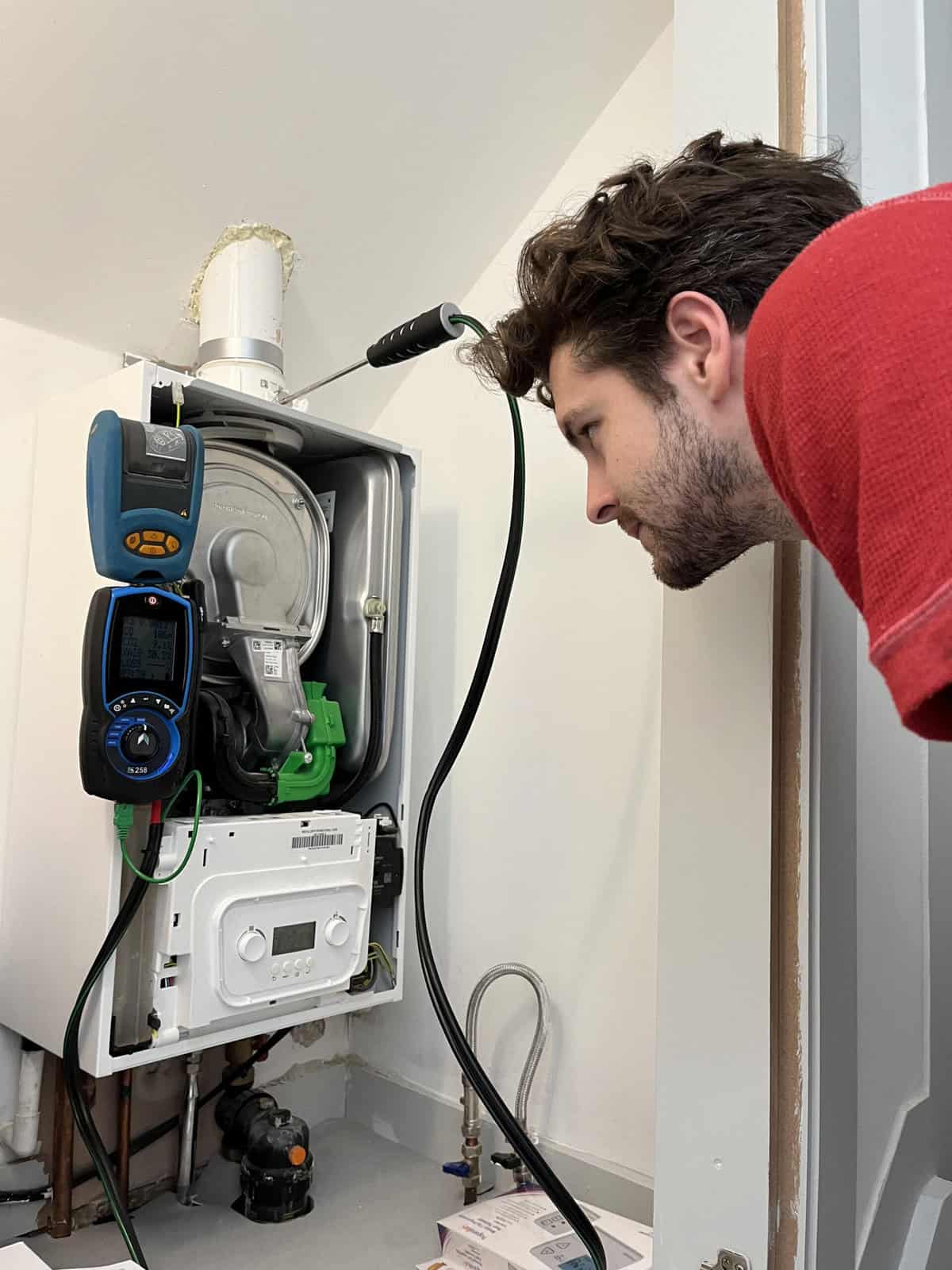
Gas Safety Certificate
As a Gas Safe registered plumber we can carry out a thorough inspection, ensuring that:
All gas appliances are operating safely and at the correct pressure
Ventilation routes are clear and functioning properly
Safety devices and fire hazards are appropriately addressed
We are highly experienced
We bring over 40 years of expertise to every inspection we conduct. With comprehensive knowledge of all aspects of heating and plumbing systems, you can trust the certifications and recommendations we offer.
We are a family-run business
As a family-run business, we understand the importance of dependable services, especially when it comes to the safety of your property. Our commitment is to deliver peace of mind with every job we undertake.
Personal service
Your satisfaction is our future
Reliability and continuity
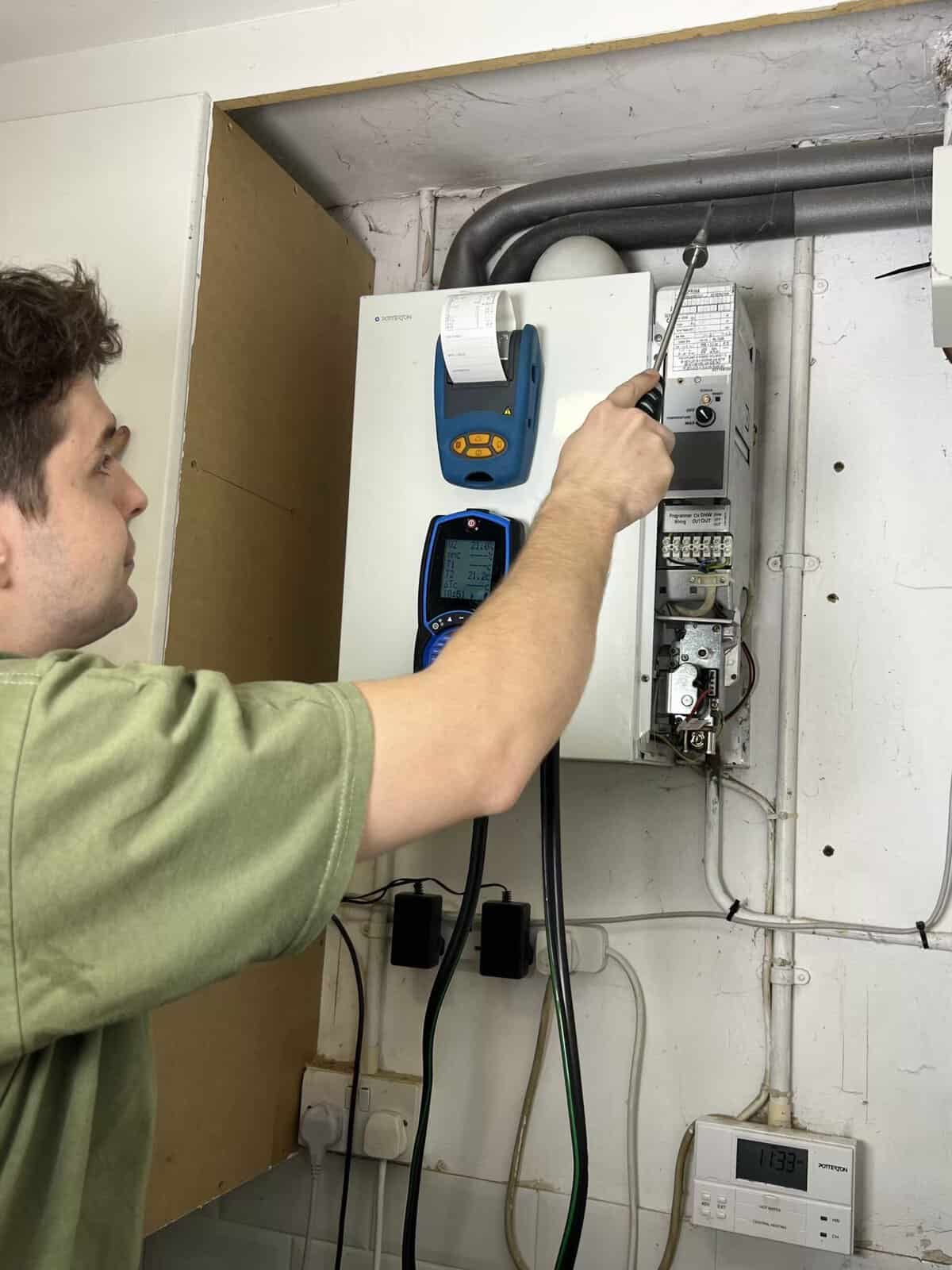
We provide quick quotes
We provide hassle-free consultations tailored to your convenience. Whether you prefer an in-person meeting or a virtual video call, we will discuss your requirements and potential solutions before offering a prompt quotation.
Our team of qualified Gas Safe plumbers are local and quick to respond. You can count on us for reliable and professional support.
Expert advice
Emergency call-out
We can fit around your schedule
Do I need a Gas Safety Certificate?
As a landlord, you’ll need a commercial Gas Safety Certificate or CP12 for each gas appliance in your rental property. It’s a legal requirement and each individual certificate has to be renewed every year. Without them you risk a hefty fine, and the appliances may be unsafe for tenants to use.
We offer gas safety checks on a wide range of domestic gas appliances:
Boilers and cookers
Gas fires
warm air units
Example of works undertaken
Servicing and Gas Safety Check of an Alpha Eco 240e condensing boiler.
We arrived at the flat and were greeted by the tenant. After carrying out a full three part gas tightness test, we began the process of gas safety checking the boiler.
Following a visual inspection of the flue, we noticed rust forming at the terminal.
This can become deadly very fast as a hole in the flue wall can allow fresh air and exhaust gases to mix and return into the boiler. There is a possibility that this could create incomplete combustion and flood the room with carbon monoxide, an odourless gas that suffocates those who inhale it on a cellular level, to read more on carbon monoxide, see this article.
Without a new flue the boiler would not pass a gas safety check and cannot be awarded a gas safety certificate.
We informed the customer of the situation and proceeded to purchase and fit a new flue and complete the gas safety checks at this property in the same day.
Price:
Gas Safety Check: £80.00
Flue replacement: 4 hours @ £80.00/ph
Parts: New flue and parts £ 108.76
Total: £508.76
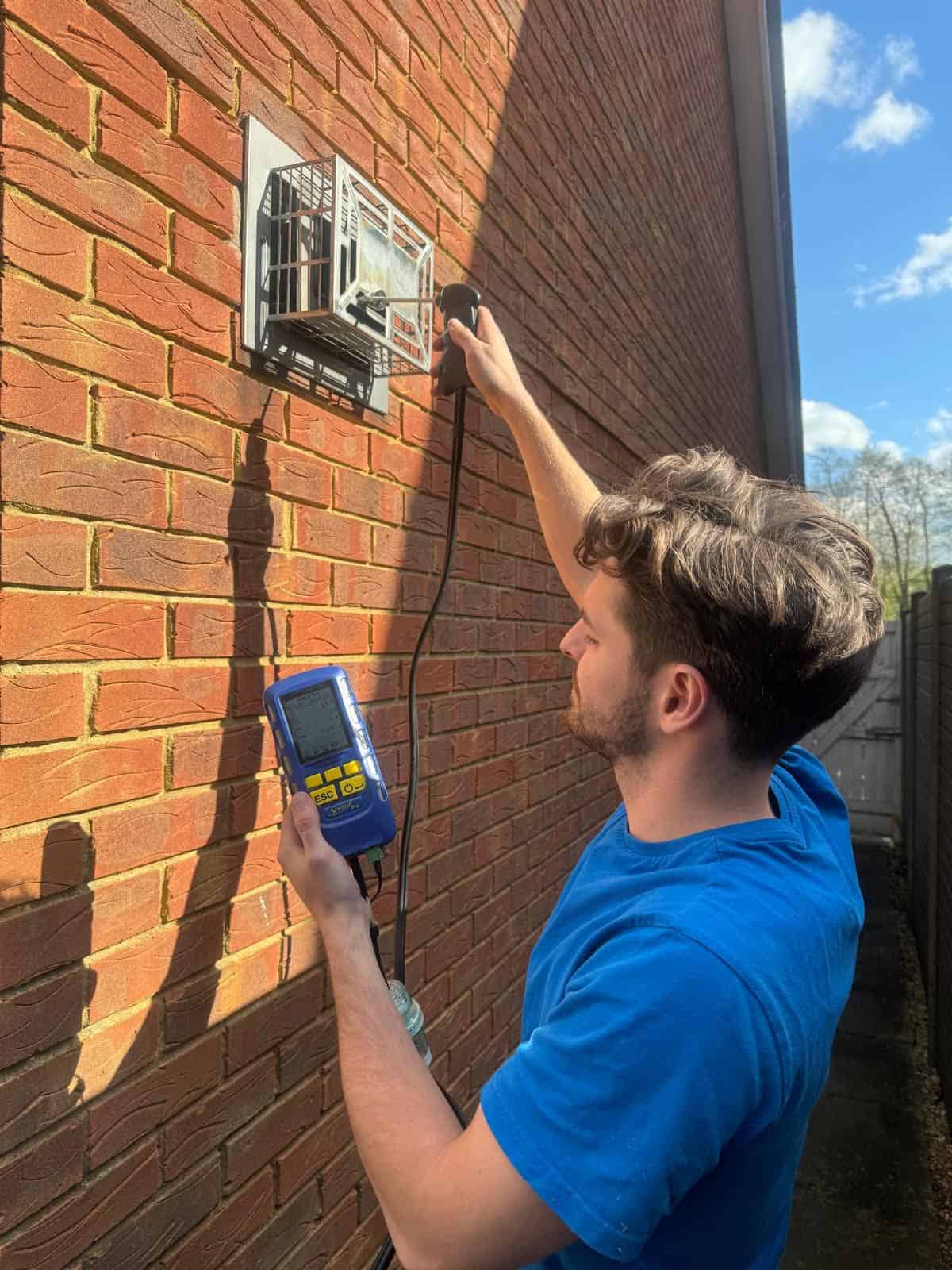
Why do gas fitters need to be registered?
Gas-related work is a specialised trade that should always be handled by qualified professionals. While your DIY skills might be sufficient for tasks like putting up shelves or even replacing a radiator, working with gas appliances is a completely different matter—there’s a lot that can go wrong, and improper installation can have serious consequences.
The health and safety risks associated with poorly conducted gas work include:
Explosions
Fires
Gas leaks
Carbon monoxide poisoning (see below)
Additionally, the appliance itself may not function correctly, but that would be the least of your concerns if a boiler or cooker has been installed by someone unqualified.
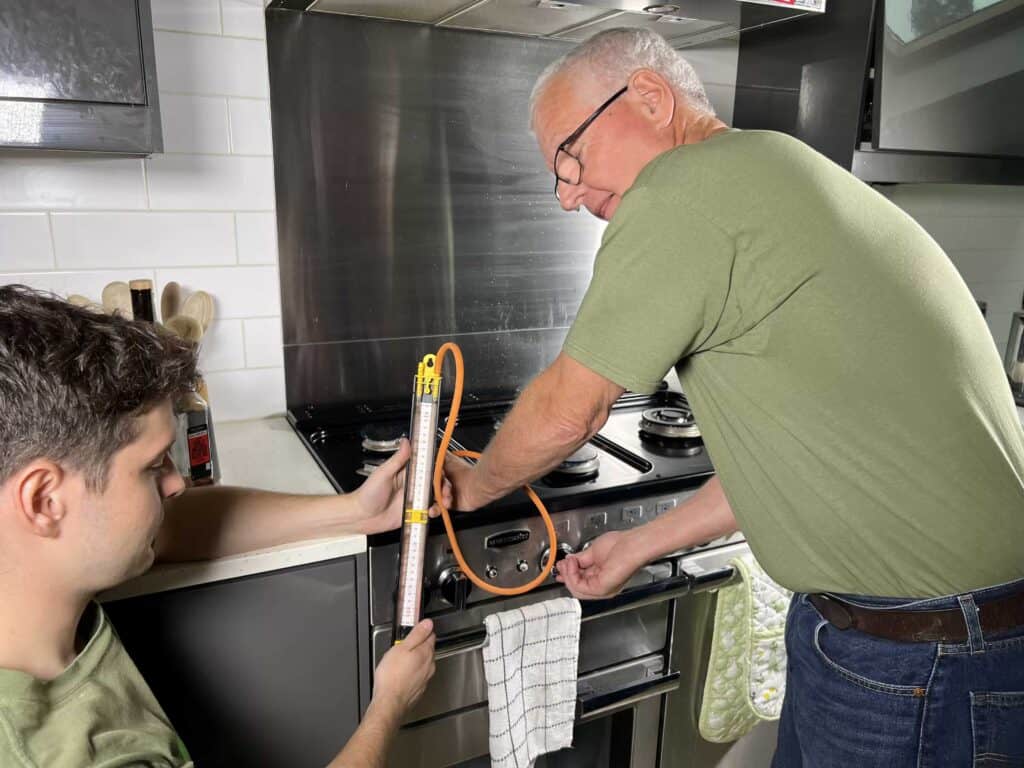
To prevent illegal and unsafe gas work in the UK, the law requires all gas engineers and businesses to be registered. This system ensures that the public can easily identify competent professionals and avoid unqualified individuals whose work could result in dangerous situations.
What is Carbon Monoxide (CO)?
Carbon monoxide (CO) is a highly toxic gas produced by the incomplete combustion of any carbon-based fuel, such as natural gas or liquefied petroleum gas (LPG). This can occur when a gas appliance is incorrectly installed, poorly repaired, or inadequately maintained. CO can also accumulate if flues, chimneys, or vents become blocked.
Other solid fuels, including coal, wood, petrol, and oil, can also produce carbon monoxide when burned.
Known as the ‘silent killer’, carbon monoxide is undetectable by sight, smell, or taste.
How does Carbon Monoxide poisoning occur?
When you inhale carbon monoxide, it displaces the oxygen in your bloodstream. CO poisoning occurs as the gas builds up in your system, depriving cells of oxygen, which leads to their failure and death. Even small amounts of carbon monoxide can cause poisoning, which can lead to paralysis, brain damage, or even death.
What are the signs of a Carbon Monoxide (CO) leak?
The following may indicate a carbon monoxide leak:
A floppy yellow or orange flame on your gas hob or oven, instead of a crisp blue flame.
Dark, sooty stains on or around gas appliances.
Pilot lights that frequently go out.
Increased condensation on windows.
How can I prevent Carbon Monoxide (CO) poisoning in my home?
The most crucial step in reducing the risk of CO poisoning is to have your gas appliances checked annually by us.
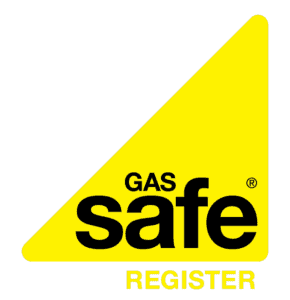
Installing an approved audible carbon monoxide alarm in your home is an effective second line of defence, as it emits an alert when CO is detected. However, because a CO alarm only activates when the gas is present, it should never be your sole method of prevention.
Ensure you have your gas appliances checked regularly, preferably annually. It is not that costly, and it could save your life.
Symptoms of Carbon Monoxide (CO) Poisoning
Carbon monoxide can be fatal or lead to serious long-term health issues. Its danger lies in the fact that you can’t see, taste, or smell it, and the symptoms of CO poisoning can easily be confused with those of flu, food poisoning, viral infections, fatigue, or even a hangover, making it difficult to recognise the severity of the situation.
The six primary symptoms of carbon monoxide poisoning are:
- Headaches
- Dizziness
- Nausea
- Breathlessness
- Collapse
- Loss of consciousness
Recognising these symptoms could save your life.
There may also be other signs that indicate CO poisoning, such as:
- Symptoms improve when you leave your home.
- Others in your household experience similar symptoms at the same time.
- Pets display unusual behaviour, such as aggression, anxiety, or fear of noises, or symptoms like vomiting.
What to do if you suspect Carbon Monoxide (CO) poisoning:
It’s essential to act swiftly if you suspect CO poisoning:
- Turn off the gas appliance (if it’s safe to do so).
- Open doors and windows to allow fresh air in.
- Leave the property and go outside to breathe fresh air.
Seek medical advice as soon as possible. If you suspect CO poisoning, contact NHS 111.
If someone is experiencing severe symptoms, such as difficulty breathing, confusion, or loss of consciousness, call 999 or go to A&E immediately.
For gas-related emergencies, contact the Gas Emergency Helpline on 0800 111 999 (GB) or the relevant service in your area.
Contents
